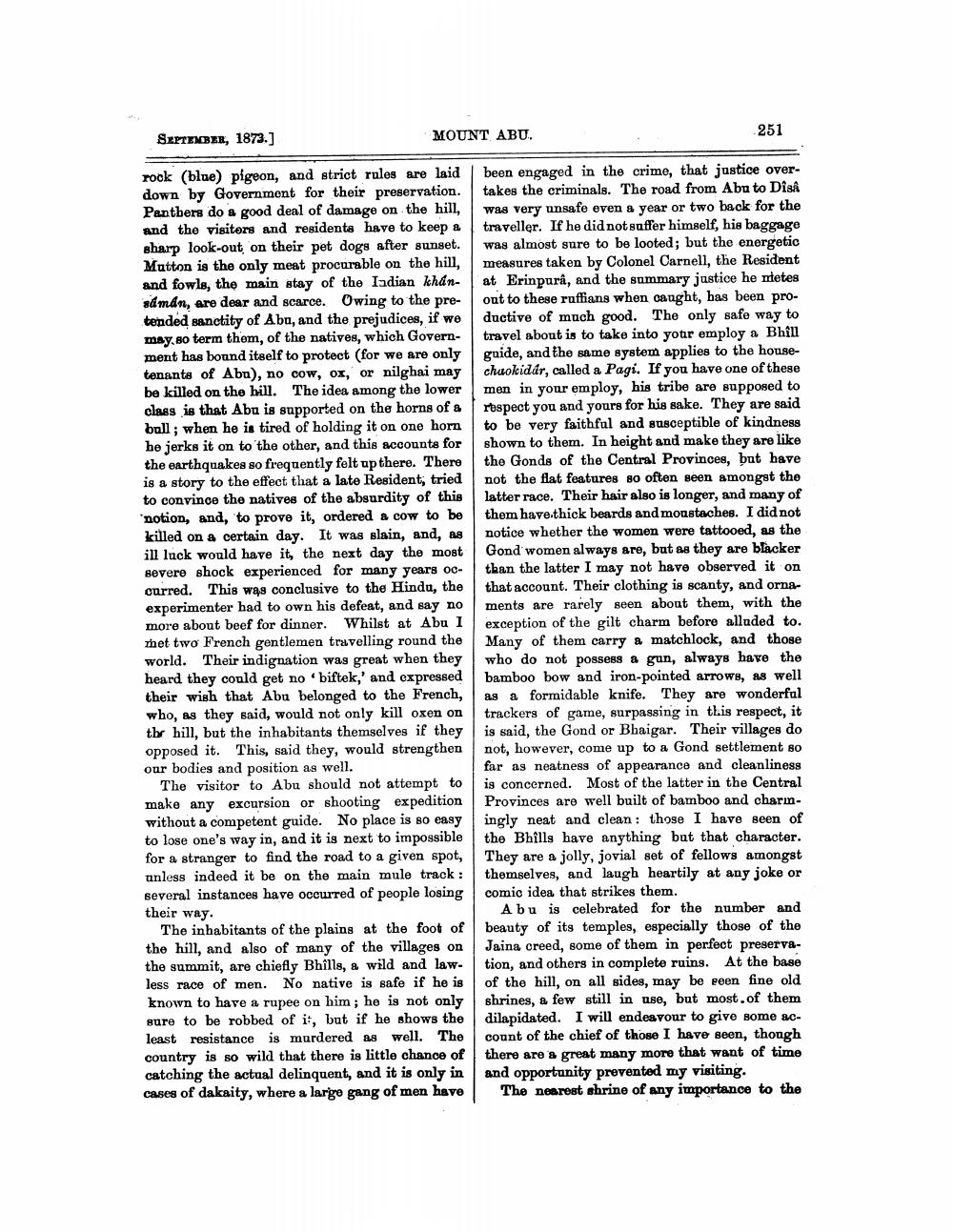________________
MOUNT ABU.
SEPTEMBER, 1873.]
rock (blue) pigeon, and strict rules are laid down by Government for their preservation. Panthers do a good deal of damage on the hill, and the visitors and residents have to keep a sharp look-out, on their pet dogs after sunset. Mutton is the only meat procurable on the hill, and fowls, the main stay of the Indian khansámán, are dear and scarce. Owing to the pretended sanctity of Abu, and the prejudices, if we may.so term them, of the natives, which Government has bound itself to protect (for we are only tenants of Abu), no cow, ox, or nilghai may be killed on the hill. The idea among the lower class is that Abu is supported on the horns of a bull; when he is tired of holding it on one horn he jerks it on to the other, and this accounts for the earthquakes so frequently felt up there. There is a story to the effect that a late Resident, tried to convince the natives of the absurdity of this notion, and, to prove it, ordered a cow to be killed on a certain day. It was slain, and, as ill luck would have it, the next day the most severe shock experienced for many years occurred. This was conclusive to the Hindu, the experimenter had to own his defeat, and say no more about beef for dinner. Whilst at Abu I met two French gentlemen travelling round the world. Their indignation was great when they heard they could get no biftek,' and expressed their wish that Abu belonged to the French, who, as they said, would not only kill oxen on the hill, but the inhabitants themselves if they opposed it. This, said they, would strengthen our bodies and position as well.
The visitor to Abu should not attempt to make any excursion or shooting expedition without a competent guide. No place is so easy to lose one's way in, and it is next to impossible for a stranger to find the road to a given spot, unless indeed it be on the main mule track: several instances have occurred of people losing their way.
The inhabitants of the plains at the foot of the hill, and also of many of the villages on the summit, are chiefly Bhills, a wild and lawless race of men. No native is safe if he is known to have a rupee on him; he is not only sure to be robbed of it, but if he shows the least resistance is murdered as well. The country is so wild that there is little chance of catching the actual delinquent, and it is only in cases of dakaity, where a large gang of men have
251
been engaged in the crime, that justice overtakes the criminals. The road from Abu to Dîsâ was very unsafe even a year or two back for the traveller. If he did not suffer himself, his baggage was almost sure to be looted; but the energetic measures taken by Colonel Carnell, the Resident at Erinpurâ, and the summary justice he metes out to these ruffians when caught, has been productive of much good. The only safe way to travel about is to take into your employ a Bhill guide, and the same system applies to the housechaokidar, called a Pagi. If you have one of these men in your employ, his tribe are supposed to respect you and yours for his sake. They are said to be very faithful and susceptible of kindness shown to them. In height and make they are like the Gonds of the Central Provinces, but have not the flat features so often seen amongst the latter race. Their hair also is longer, and many of them have thick beards and moustaches. I did not notice whether the women were tattooed, as the Gond women always are, but as they are blacker than the latter I may not have observed it on that account. Their clothing is scanty, and ornaments are rarely seen about them, with the exception of the gilt charm before alluded to. Many of them carry a matchlock, and those who do not possess a gun, always have the bamboo bow and iron-pointed arrows, as well as a formidable knife. They are wonderful trackers of game, surpassing in this respect, it is said, the Gond or Bhaigar. Their villages do not, however, come up to a Gond settlement so far as neatness of appearance and cleanliness is concerned. Most of the latter in the Central Provinces are well built of bamboo and charmingly neat and clean: those I have seen of the Bhills have anything but that character. They are a jolly, jovial set of fellows amongst themselves, and laugh heartily at any joke or comic idea that strikes them.
Abu is celebrated for the number and beauty of its temples, especially those of the Jaina creed, some of them in perfect preservation, and others in complete ruins. At the base of the hill, on all sides, may be seen fine old shrines, a few still in use, but most.of them dilapidated. I will endeavour to give some account of the chief of those I have seen, though there are a great many more that want of time and opportunity prevented my visiting.
The nearest shrine of any importance to the




